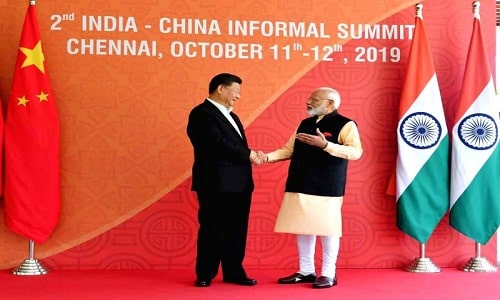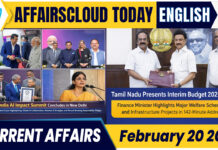The second informal summit between the Prime Minister(PM) of India Shri Narendra Modi and the President of the People’s Republic of China Mr Xi Jinping was held in Mahabalipuram,Tamil Nadu, on 11-12 October 2019. Previously, the first informal summit between the two nations was held in Wuhan, China in April 2018. Both leaders attended cultural programme at the shore temple in Mahabalipuram on the inaugural day of the meet.Some of the important events during the meet are as follows,
India relaxes e-visa rules for Chinese nationals
- The Indian embassy in Beijing, China has announced relaxations in its e-visa policy for Chinese nationals that would enhance people-to-people exchanges between the two countries and also develop Indian tourism.
- Relaxations: From October 2019, Chinese nationals will be able to apply for e-Tourist visa (e-TV) with 5-year validity and multiple entries costing USD(United States Dollar) 80. Single-entry 30-day validity e-TV can be availed at USD 25 for tourists, while it would cost only USD 10 for a 30day e-TV during April-June.One-year multiple-entry e-TV will be offered but at a reduced visa fee of USD 40.
- e-medical visa, e-conference visa, and the one-year multiple-entry e-business visa will also continue to be issued from Indian visas online platform.
2020: Year of India-China Cultural and People to People Exchanges
- The two Leaders decided to designate 2020 as Year of India-China Cultural and People to People Exchanges. The year 2020 also marks the 70th anniversary of the establishment of India-China relations. The two leaders will also organise 70 activities including a ship voyage conference as part of the celebration.
India, China to set up a new mechanism for trade and investment related issues
- During the summit, the two nations agreed to set up a High-Level Economic and Trade Dialogue mechanism to reduce trade deficit, trade enhancement, services and investments.
- Through the diplomatic channels, the activation of this mechanism will be decided. While the Chinese side will be represented by Vice Premier Hu Chunhua, the Indian side will be represented by the Finance Minister, Nirmala Sitharaman
- Trade deficit: Trade deficit which means the value of Import is more than the value of export was the key talk during the bilateral delegation level meet at Kovalam, TamilNadu. After shri Modi raised the issue on trade deficit, the Chinese president agreed to take severe action on reducing the trade deficit which is of $53 billion. China welcomed investment in sectors like information technology and pharmaceuticals from India as it would enhance job creation in both sides.
- Defence & security: Issue on defence and security was raised by the Chinese president and also raised the need for enhanced trust between the two nation’s defence forces. The Chinese side also sent an invitation to the Indian defence minister Shri Rajnath Singh to visit China.
- Terrorism: India and china posed terrorism as a common threat and ensured in working together in reducing terrorism by strengthening the framework against terror financing, training and supporting the terrorist groups.
- RCEP: Both leaders agreed on the importance of concluding negotiations for a mutually-beneficial and balanced Regional Comprehensive Economic Partnership(RCEP). RCEP is a proposed free trade agreement (FTA) between the ten member states of the Association of Southeast Asian Nations (ASEAN) (Brunei, Cambodia, Indonesia, Laos, Malaysia, Myanmar,Philippines, Singapore, Thailand, Vietnam) and its six FTA partners (China, Japan, India, South Korea, Australia and New Zealand).
Gifts to chinese president Xi Jinping by Modi
- Annam lamp and tanjore painting: Prime Minister Narendra Modi gifted Nachiarkoil, a six-feet Annam lamp coated with gold and also a three-feet high Thanjavur painting of dancing Saraswathi(Godess) to the Chinese President on October 11, 2019. The lamp, which bears Annam (bird that can separate milk from water) was made in Nachiarkoil town of TamilNadu and is 6feet tall weighing 108kg.
- Handwoven red silk shawl: Prime Minister Narendra Modi presented President Xi Jinping, a gold-and-red silk handwoven shawl bearing his image on the 12th october 2019. The shawl was designed by Sri RamalingaSowdambigai Weavers’ Cooperative Society from Sirumugaipudur district in Coimbatore, TamilNadu.
Sister state connections
- The age-old commercial linkages and people-to-people contacts between India and China date back to the past two millennia, including maritime contacts.
- The two leaders agreed to establish a sister-state link between Tamil Nadu and Fujian province of China to study the link between Mahabalipuram and Fujian on their maritime connections.
Indian delegation:
- The Indian delegation which was led by Modi, also consisted of AjitDoval, National Security Advisor(NSA); S Jaishankar, External Affairs Minister(EAM) and Vijay Gokhale, Foreign Secretary.
3rd informal summit:
In line with the ‘Wuhan Spirit’ (contribution for global peace development following 1st informal summit) and the ‘Chennai Connect”. They agreed to continue this practice in the future. Prime Minister Modi has accepted the invitation of President Xi to visit China for the 3rd Informal Summit.
Mahabalipuram-china relation:
- Mahabalipuram (mamallapuram) which is a UNESCO (United Nations Educational, Scientific and Cultural Organization) world heritage site has had trade links with China 2000 years ago. The name Mamallapuram derives from Mamallan, or “great warrior”,by which the Pallava King Narasimhavarman I (630-668 AD) was known.
- Evidence of trade: The Celadon ware (pottery), Chinese coins, found in the Mahabalipuram region strengthens the trade connection between India and China since the Pallava dynasty. The ancient poem “Pattinapalai” written during the Sangam period (1st-6th century BC) cites anchorage of Chinese ships in the east coast of Tamil Nadu. Emperor Wei (circa 185-149 BCE) made mention of Kancheepuram and had also sent presents to the Tamil kings. Bodhi Dharma, a Pallava king, who originated martial arts, lived in China as a Buddhist monk for a long time. Hiuen Tsang, the Chinese Buddhist monk-traveler, visited the Pallava capital at Kancheepuram.
Youtube Source: Ancient Indian – Chinese Connection Revealed at Mahabalipuram
About China:
Capital- Beijing.
Currency- Renminbi.





